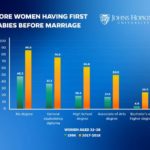 All Entries in the "Research/Study" Category
All Entries in the "Research/Study" Category

The Higher Education Gender Gap in Enrollments Is Compounded by Lower Graduation Rates for Men
In 1972, there was a 12 percentage-point gap in favor of men in bachelor’s degree awards. By 1982, following the passage of the landmark Title IX laws, the gender gap had closed. Nobody predicted what happened next: the gap started to widen rapidly in the opposite direction.

Gender Identity and Sexual Orientation in the United States
The United States Census Bureau recently has included questions on sexual orientation and gender identity in its Household Pulse Survey. Of the 51.6 percent of adults who were assigned female at birth, 0.6 percent now identify themselves as transgender. Another 0.3 percent now identify as male and 1.7 percentage identify as neither male, female or transgender.

New Report Reveals Gender Gaps in Graduate Management Education Throughout the World
In the United States, there are 3,282,085 women between the ages of 20 and 34 who hold master’s degrees compared to 2,845,136 men, according to the report. But men out number women in graduate management education master’s degrees by a margin of 814,662 to 602,404. Thus, men hold 57 percent of all graduate degrees in management.

The Gender Gap in Voter Participation Rates of College Students
In 2020, 64 percent of women college students voted compared to 58 percent of male students. The voter participation rate at women’s colleges was particularly high, significantly higher than for college students generally. In 2020, 76 percent of all students at women’s colleges cast ballots.

The Gender Gaps in Graduate Degree Awards in Some Specific Disciplines Are Huge
In the 2019-20 academic year, women made up nearly 81 percent of all master’s degree recipients in health science fields and more than 80 percent of all master’s degree recipients in public administration. But women earned just 27.8 percent of all master’s degrees in engineering fields and 35 percent of all master’s degrees in mathematics and computer science.

Georgetown University Report Examines the Status of Women in the 50 States and Around the World
The report uses a series of indicators to assess the status of women including legal discrimination against women, intimate partner violence, education, employment, financial inclusion, parliamentary representation, cellphone use, and other factors. Norway was rated the best country for women and Massachusetts the best state.

Gender Trends in Higher Education Enrollments in the Age of the Global Pandemic
New research from the National Student Clearinghouse Research Center shows that higher education enrollments of women are down 3.6 percent from a year ago, slightly more than the decline for men. But over the two-year period from 2019 to 2021, enrollments of women have dropped 5.3 percent compared to more than 9 percent for men.

Gender Differences in Test Scores on the ACT College Entrance Examination
For the high school Class of 2021, the average score for women who took the ACT college entrance examination was 20.6. For men, the average score was 20.3. Women had higher scores than men in reading and English, but men had slightly higher scores than women in mathematics and science.

Women’s Enrollments in Graduate School Held Steady After the Onset of the Pandemic
New data from the Council on Graduate Schools women shows women were only 29.3 percent of all first-time graduate students in engineering. Women were 33.6 percent of all first-time graduate students in mathematics and computer science, down from 34.6 percent in 2019.

Study Shows How Evaluators’ Gender Biases Can Be Reduced
In ratings on Yelp, women restaurant servers were more likely than men to receive just one star in approval ratings and were less likely than men to get the highest five-star rating. But the authors found that among Yelp reviewers who had received an “Elite” designation, the gender gap in their reviews became smaller.

Evidence That Women’s Scholarly Production Was Slowed More Than Men During the Early Pandemic
The analysis of more than 63,000 manuscripts submitted to 11 leading biomedical journals found that prior to the pandemic women were 46 percent of first authors on papers submitted to these journals. Women were 37.1 percent of first authors for COVID-related manuscripts during the pandemic but only 29.4 percent of the authors during the initial six months of the global crisis.

The Lack of Gender Diversity in Climate Change Research
Several recent studies have shown that women are only a small percentage of the leading researchers in climate change, according to the number of published research appears and citations of published scholarly work.

Women Archaeologists Negatively Impacted by the Pandemic More Than Their Male Peers
A new study led by Julie Hoggarth, an associate professor of anthropology at Baylor University in Waco, Texas, surveyed a large group of professional archaeologists on their experiences of job loss; economic, workload, research and training impacts; and changes in personal responsibilities after the onset of the COVID-19 pandemic.

Study Finds Girls Are Alienated From Politics at an Early Age
Students in grades 1 to 6 were given the task of drawing a political leader. Of the 1,604 students in the study, 66 percent drew a man as the primary political leader but only 13 percent depicted a woman. Of note, male political leaders dominated the drawings of students regardless of sex.

Social Inclusion of Women by Male Colleagues in STEM Fields Can Improve Their Workplace Experience
Surveys of 1,247 professional scientists and engineers from nine organizations, found that even a small amount of social inclusion of women by male colleagues can go a long way toward reducing the gender barriers experienced by women in STEM fields.

Study Finds an Inverse Relationship Between Breastfeeding Length and Risk of Postpartum Depression
A new study of 29,685 women living in 26 states led by Christine Toledo an assistant professor in the College of Nursing at Florida Atlantic University, finds that as the number of weeks new mothers breastfeed their infants increase, the lower their risk for postpartum depression.

The Expanding Gender Gap in Poverty Rates in the United States
The gender gap in poverty rates expanded in the year in which the COVID-19 pandemic ravaged the U.S. economy. There were more than 10.1 million women and girls who lived in families where their incomes were less than one half of the official poverty rate. There were just 7.8 million men who lived in these conditions of severe poverty.

Study Finds That Women Often Do Not Receive the Credit They Deserve for Academic Scholarship
According to the study of more than 5,500 researchers in multiple fields, women were significantly more likely than men to report disagreements about who was named on a paper and in the order of authorship. The researchers found this to be particularly true in natural sciences and engineering.

Do Non-Tenured Women Faculty Inflate Grades More Than Men to Increase Their Chance of Retention?
The findings indicate that students are more likely to receive higher grades when they take classes with female instructors who hold positions with more contract uncertainty (temporary or pre-tenure) than if the instructor is tenured, but that there is little to no difference in grades received across faculty rank of male instructors.

Census Bureau Reports on the Gender Gap in Median Income and Earnings From Work in 2020
In 2020, the median income level for family households headed by a single woman was 73.1 percent of the median income for family households headed by a single man and 48.5 percent of the median income of married-couple families. Both of these income gaps narrowed slightly from the previous year in 2019.

Study Finds Managers Rate Women’s Performance High but Their Potential Low
The analysis by scholars at the University of Minnesota, MIT, and Yale University, found that women are 14 percent less likely to be promoted at the company in each year, and that a major factor preventing women from being promoted is that they are consistently judged as having lower leadership potential than men.

The Pandemic Widened the Gender Gap in Higher Education Enrollments
There were 11,350,777 women students enrolled in higher education last fall. In the fall of 2019, there were 11,274,609 women enrolled. Thus, enrollments of women were up slightly. In contrast, there were 8,004,350 men enrolled in high education in the fall of 2020, A year, earlier, 8,362,890 men were enrolled. Thus, while women’s enrollments were up, the enrollments of men dropped by 4.3 percent.

College-Educated Women Are Increasingly Having Babies Before Marriage
A new study authored by Andrew Cherlin, a sociologist at Johns Hopkins University in Baltimore, finds that in 1996, only 4 percent of college-educated women in their 30s had their first babies while unmarried. Twenty years later, that percentage has increased six-fold to 24.5 percent.

The Gender Gap in Online Learning Has Narrowed During the Pandemic
Coursera, Inc., one of the largest online learning platforms in the world, released a new study that found that women in the United States are learning online at higher rates compared to the pre-pandemic period, representing 52 percent of new learners in 2021, up from 47 percent in 2019. Women enrollments in online STEM courses increased from 35 percent to 42 percent.

How Marriage, Parenting, and Issue of Work-Life Balance Impact Women Academics’ Publication Rates
A new study led by Elaine Howard Ecklund, who holds the Herbert S. Autrey chair in social sciences at Rice University in Houston, Texas, found that parenting, marriage, and the strain of maintaining a work-family balance are all factors for women’s success in publishing. But there were differences by global region and academic discipline.

Differences in Educational and Employment Histories of Men and Women College Graduates a Decade Later
The study found that a decade after graduating from college, more than 28 percent of women went on to earn a master’s degree compared to 24.5 percent of men. Women were slightly less likely than men to have earned a research doctorate or a professional degree. Men, on average, earned $20,000 more per year than women.

Study Finds Gender Differences in College Student Stress Levels and Coping Mechanisms
Overall, women indicated higher levels of stress than their male counterparts. Gender differences were evident in both coping dimensions and individual coping strategies used. Women were found to utilize the emotion-focused coping dimension and endorsed the use of four coping strategies more often than males. These included self-distraction, emotional support, instrumental support, and venting.

Do Merit-Based Pay Systems Reduce the Gender Compensation Gap?
A new study led by Eunmi Mun, an assistant professor of labor and employment relations at the University of Illinois, finds that rather than reducing gender-based pay inequality by limiting managers’ reliance on factors such as gender bias and favoritism, a shift to performance bonuses and other meritocratic employment practices may actually widen the gap by preserving the status quo.

Mothers May Face a Higher Level of Job Discrimination Than Other Women
According to author Patrick Ishizuka, a sociologist at Washington University in St. Louis, discrimination against mothers likely results from conflict between the perceived time commitments necessary to be a “good mother” and an ideal worker. Whereas many professional and managerial workers are expected to work all the time, low-wage service workers are increasingly expected to work at any time.

Virginia Tech Study Finds Gender Differences in Fears About the COVID-19 Pandemic
A new study by researchers at Virginia Polytechnic Institute and State University finds that women express more fear than men over the health aspects of the COVID-19 pandemic, despite the fact that men are more likely to die from complications of the virus. Men worry more than women over the economic impact of the pandemic.

Northeastern University Study Examines Gender Differences in Physician Burnout Rates
Researchers examined data from 43 studies on physician burnout conducted between 2010 and 2019. The results showed that women physicians experience burnout more often and to a greater degree than men. In almost 90 percent of studies that compared burnout by gender, female physician samples reported higher burnout prevalence, particularly in the form of emotional exhaustion.

Is the Gender Wage Gap Due to Women’s Lack of Assertiveness in Negotiations?
A recent study led by Denise L. Reyes, a new assistant professor of psychology at the University of Houston, comes to the conclusion that the salary gap between men and women may be due to certain personality traits, specifically – assertiveness.

Has the 21st-Century Economy Produced a Change in Marriage Patterns in the United States?
According to new research led by University of Wisconsin–Madison professor of sociology Christine Schwartz, the tendency of people to marry those with similar jobs has not changed much over the past half century. Due especially to the increased representation of women in professional jobs, dual-professional marriages have become by far the most common coupling.

University of Minnesota Research Finds Eating Disorders Affect Women in All Socioeconomic Groups
Many people have the impression that eating disorders mainly affect White girls and women from middle and high-income families. But new research from scholars at the University of Minnesota finds that binge eating and use of unhealthy weight control behaviors are prevalent among young people from diverse socioeconomic backgrounds.

In the Field of Communication, Women’s Scholarship Is Cited Less Often Than the Work of Men
The analysis, led by researchers at the Annenberg School of Education at the University of Pennsylvania, showed that papers by men were over-cited and papers by women were under-cited relative to the citation rates you would expect if references were drawn randomly and gender was not affecting citation practices.








